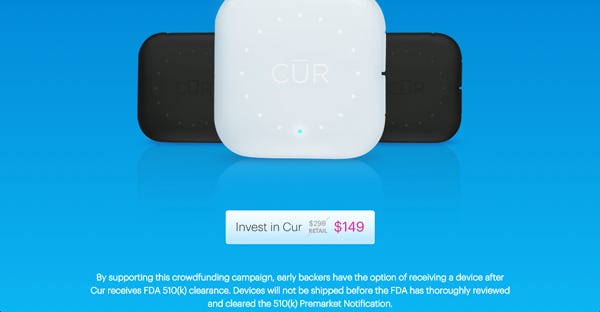Startup Tests FDA Limits with Crowdfunding Campaign
May 15, 2015
Startup Cur's fundraising for its painkilling wearable raises eyebrows among legal experts.
Chris Newmarker
|
A screen grab of Cur's homepage on May 15, 2015 |
Cur (San Francisco) is touting a wearable that could potentially relieve chronic pain. But some legal experts are questioning whether the startup is running afoul of FDA rules not to sell devices before they receive clearance.
The company has yet to file for 510(k) clearance. But already, it is urging people on its website to donate $149 to the company in order to receive a device after FDA clearance is won.
"Sounds pretty illegal to me," Diana Zuckerman, president of the nonprofit National Center for Health Research, told The Verge. Two lawyers contacted by Qmed agree that there are issues.
FDA rules prohibit commercialization of a device before it wins clearance, including taking pre-orders.
Cur officials argue that the company is not selling its device or taking pre-orders per se, but is seeking donations with the potential of receiving a device as a reward, should Cur receive 510(k) clearance. They say the activity is not marketing, but rather they are seeking investors to finish development including regulatory approval.
After The Verge's initial article, the company changed its website to say, "Invest in Cur," instead of, "Get Cur Now," among other changes.
The idea behind the Cur is to take a transcutaneous electrical nerve stimulation (TENS) device for pain treatment--a somewhat box-like device that has been around for decades--and turn it into something Band Aid-sized that is affordable, portable, and easy to use.
"Our crowdfunding campaign was designed to support the continuing development operations and 510(k) Premarket Notification submission of Cur," founder Shaun Rahimi said in a statement shared with The Verge and Qmed. "While we thought we were clear, The Verge article enlightened us that our website needed further clarification. Our crowdfunding campaign will remain the same and we are updating our website to reflect that early investors who support us will have the opportunity to receive a Cur perk only after we receive 510(k) clearance from FDA. We have complete confidence that we'll receive FDA clearance based on similar predicate products in the market."
An FDA spokeswoman declined to comment when contacted by Qmed, saying FDA has a policy of not commenting on products that it has not reviewed or approved.
"This issue is being legitimately raised over whether they are over the boundary," Jeffrey K. Shapiro, a medical device industry lawyer at Hyman, Phelps & McNamara in Washington, DC. "I would advise them to restructure it so that the investors get some kind of return out of their investment."
"It's a sale by any other name," said Jonathan Kahan, a partner at Hogan Lovells in Washington, DC. Kahan recalled a client in the early 1990s that asked potential customers to send $350 in the mail for a chance to receive an excimer laser should it receive clearance. It was enough to spur an FDA investigation, though Kahan says the matter was eventually closed.
Shapiro has not seen FDA enforce the provision in a Warning Letter over 20 years. That doesn't mean Cur is in the clear, though. "There's always a first, and this could be it. This could be a novel, cutting-edge technology that the FDA might want to make an example of."
Refresh your medical device industry knowledge at MD&M East in New York City, June 9-11, 2015. |
Chris Newmarker is senior editor of Qmed and MPMN. Follow him on Twitter at @newmarker.
Like what you're reading? Subscribe to our daily e-newsletter.
About the Author(s)
You May Also Like


.png?width=300&auto=webp&quality=80&disable=upscale)
